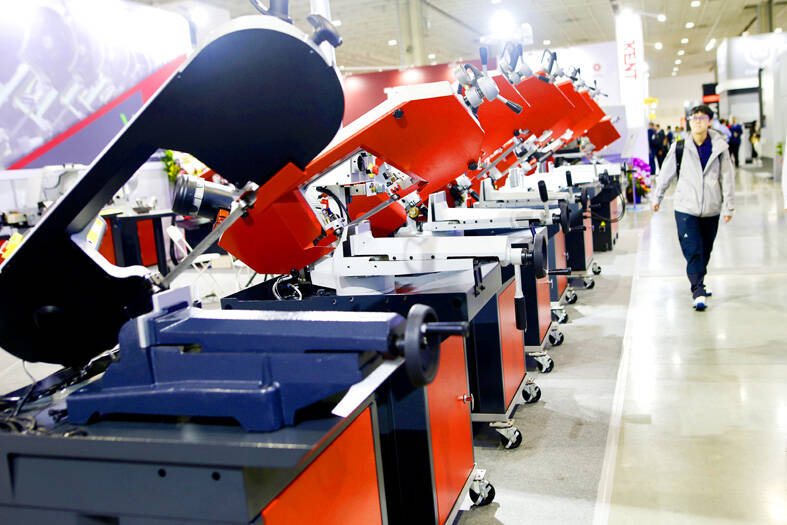The nation’s machinery exports in the first two months of this year rose 1.4 percent year-on-year, the Taiwan Association of Machinery Industry (TAMI, 台灣機械公會) said in a report yesterday.
The association released the data for the first two months to avoid distortions from the week-long Lunar New Year holiday — which was mostly in January this year, but was in February last year — when many businesses and factories were closed.
Taiwan’s machinery exports are mainly comprised of inspection and testing equipment, electronic equipment and machine tools. Overseas shipments totaled US$4.37 billion in January and last month, up from US$4.3 billion in the same period last year, data compiled by the association showed.

Photo: EPA-EFE
The performance echoed the latest purchasing managers’ index for Taiwan’s manufacturing sector, which suggested an improvement in local firms’ operations on the back of more orders, higher production capacity and inventory growth, the Chung-Hua Institution for Economic Research (中華經濟研究院) said on Wednesday last week.
The latest data showed overseas shipments of inspection and testing equipment increased 2.5 percent annually to US$756 million, while electronic equipment shipments rose 14 percent to US$730 million during the first two months.
Exports of machine tools in the first two months declined 18.9 percent year-on-year to US$273 million, with metal-cutting machine tools exports falling 22.2 percent to US$215 million and metal-forming machinery sliding 3.6 percent to US$57.18 million, which was attributed to weak demand.
As many Taiwanese firms received orders and buyer inquiries during the Taipei International Machine Tool Show last week, the association said it maintains a cautiously optimistic view of the segment going forward.
The US and China remained the two largest buyers of Taiwanese machinery products in the first two months at US$1.19 billion and US$923 million respectively, the association said.
The US accounted for 27.2 percent of the nation’s total exports, followed by China at 21.1 percent and Japan at 8.6 percent, whose total purchases reached US$374 billion, the report showed.
Taiwan’s machinery exports to China fell by 1 percent in the first two months, while those to the US rose 8.7 percent, the report said.
Although machinery products might not be directly affected by US President Donald Trump’s trade policies, indirect impacts would be inevitable, as US tariffs could trigger a global trade war, the association said.

TAKING STOCK: A Taiwanese cookware firm in Vietnam urged customers to assess inventory or place orders early so shipments can reach the US while tariffs are paused Taiwanese businesses in Vietnam are exploring alternatives after the White House imposed a 46 percent import duty on Vietnamese goods, following US President Donald Trump’s announcement of “reciprocal” tariffs on the US’ trading partners. Lo Shih-liang (羅世良), chairman of Brico Industry Co (裕茂工業), a Taiwanese company that manufactures cast iron cookware and stove components in Vietnam, said that more than 40 percent of his business was tied to the US market, describing the constant US policy shifts as an emotional roller coaster. “I work during the day and stay up all night watching the news. I’ve been following US news until 3am

Six years ago, LVMH’s billionaire CEO Bernard Arnault and US President Donald Trump cut the blue ribbon on a factory in rural Texas that would make designer handbags for Louis Vuitton, one of the world’s best-known luxury brands. However, since the high-profile opening, the factory has faced a host of problems limiting production, 11 former Louis Vuitton employees said. The site has consistently ranked among the worst-performing for Louis Vuitton globally, “significantly” underperforming other facilities, said three former Louis Vuitton workers and a senior industry source, who cited internal rankings shared with staff. The plant’s problems — which have not

TARIFF CONCERNS: The chipmaker cited global uncertainty from US tariffs and a weakening economic outlook, but said its Singapore expansion remains on track Vanguard International Semiconductor Corp (世界先進), a foundry service provider specializing in producing power management and display driver chips, yesterday withdrew its full-year revenue projection of moderate growth for this year, as escalating US tariff tensions raised uncertainty and concern about a potential economic recession. The Hsinchu-based chipmaker in February said revenues this year would grow mildly from last year based on improving supply chain inventory levels and market demand. At the time, it also anticipated gradual quarter revenue growth. However, the US’ sweeping tariff policy has upended the industry’s supply chains and weakened economic prospects for the world economy, it said. “Now

COLLABORATION: Given Taiwan’s key position in global supply chains, the US firm is discussing strategies with local partners and clients to deal with global uncertainties Advanced Micro Devices Inc (AMD) yesterday said it is meeting with local ecosystem partners, including Taiwan Semiconductor Manufacturing Co (TSMC, 台積電), to discuss strategies, including long-term manufacturing, to navigate uncertainties such as US tariffs, as Taiwan occupies an important position in global supply chains. AMD chief executive officer Lisa Su (蘇姿丰) told reporters that Taiwan is an important part of the chip designer’s ecosystem and she is discussing with partners and customers in Taiwan to forge strong collaborations on different areas during this critical period. AMD has just become the first artificial-intelligence (AI) server chip customer of TSMC to utilize its advanced